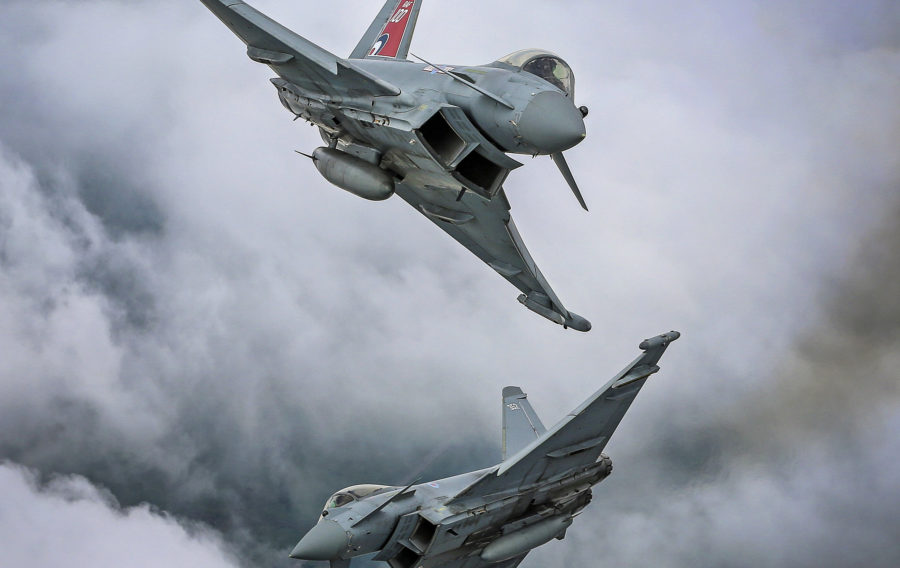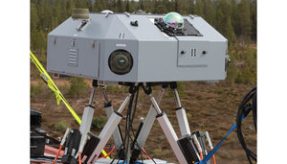
RAF pilots will get to face some ‘Gladiator’ training as the MOD recently announced a new cutting–edge simulation capability that will enable up to three pilots to be immersed in the same virtual environment.
In May, Royal Air Force Typhoon fighter jets based at Ämari Air Base in Estonia were launched to intercept Russian aircraft – the fourth Quick Reaction Alert (QRA) scramble since the RAF deployed in April 2019 as part of Baltic Air Policing.
The increasing number of unwelcome incursions from Russian aircraft highlights the important role the RAF plays alongside its NATO allies in deterring Russian aggression and assuring NATO allies of the UK’s commitment to collective defence.
Defence Procurement Minister Stuart Andrew recently visited RAF Waddington where he announced a new £36 million contract for simulation technology which can replicate up to three real-life scenarios simultaneously and independently of each other.
The system, known as ‘Gladiator’, will give the RAF unprecedented training flexibility, enabling pilots to exercise capabilities, tactics and procedures that would be impossible in the live environment due to airspace, aircraft availability or security constraints.
Mr Andrew explained: “This synthetic training technology offers the RAF a cost-effective, powerful and safe way to prepare our aircrew for the complex threats they will face on the battlefield.
“The UK-US defence partnership is already the deepest and most advanced of any two countries and now our pilots will be able to train for the front line more closely than ever.”
The system will securely manage training events across locations and classification levels, allowing RAF crews to experience the same battle environment and threats, including in joint training with their counterparts in the United States.
Rather than personnel based at different sites having to travel to train together in simulators at a common location, the system will allow them to stay where they are and train together in their own high-fidelity simulators, linked by a secure network to a new hub at RAF Waddington.
Flight Simulator and Synthetic Training Portfolio Team Leader, Russ Cole, said: “The award of this contract heralds a 21st century capability that will transform the ability of the RAF to undertake collective operations, tactics and procedures training in the synthetic environment that cannot be performed in the live environment.
“We are looking forward to working with Boeing over the next few years to design, build, deliver and operate a state-of-the-art training hub at the centre of a collective training web capability.”
The contract, signed with Boeing Defence UK, includes the design and manufacture of the simulation systems and software, and the first five years of support, sustaining up to 40 highly skilled UK jobs. The design and manufacture of the software will take place in Fleet in Hampshire and Bristol, and the equipment will be installed at RAF Waddington.
Boeing employs nearly 2500 people across the UK at numerous sites and spent £1.9 billion with UK suppliers in 2018.
Anna Keeling, Managing Director of Boeing Defence UK, was pleased to see this trend continue with this deal and with the impact the technology will have.
She said: “We are delighted the Ministry of Defence selected our proposal for this important capability. This system, designed and built in the UK, will create a secure and seamless virtual system able to provide RAF crews more time for training.”
Initially, Typhoon pilots will be able to fly virtual missions alongside their counterpart aircrews in America and interact with UK and US Joint Terminal Attack Controllers who direct combat aircraft from an advanced ground-based position. F-35 Lightning jets are to be added to the package by September 2021.
The RAF will also look to include Wedgetail early warning radar aircraft in the future, as well as upgrading the capability to enable Royal Navy and Army air assets to undertake collective training exercises.
Air Commodore David Bradshaw, Senior Responsible Owner for the programme, said the deal signalled the go-ahead for the core element of the RAF’s future synthetic training capability. He commented: “This new capability will provide a step-change in the ability of our frontline forces to train together in operationally realistic situations to meet an ever-increasing adversary threat.
“Combined with other programmes that are delivering new aircraft simulators to frontline squadrons, Gladiator will allow aircrew to hone their skills, training with colleagues and allies. Our crews will be better prepared for a range of current and potential scenarios they may face. Gladiator is the pathfinder programme for similar synthetic training solutions planned across UK Defence.”
The manufacture and design of the capability is expected to be completed within two years, with aircrew to start training on the equipment in autumn 2021.
If you would like to join our community and read more articles like this then please click here.







